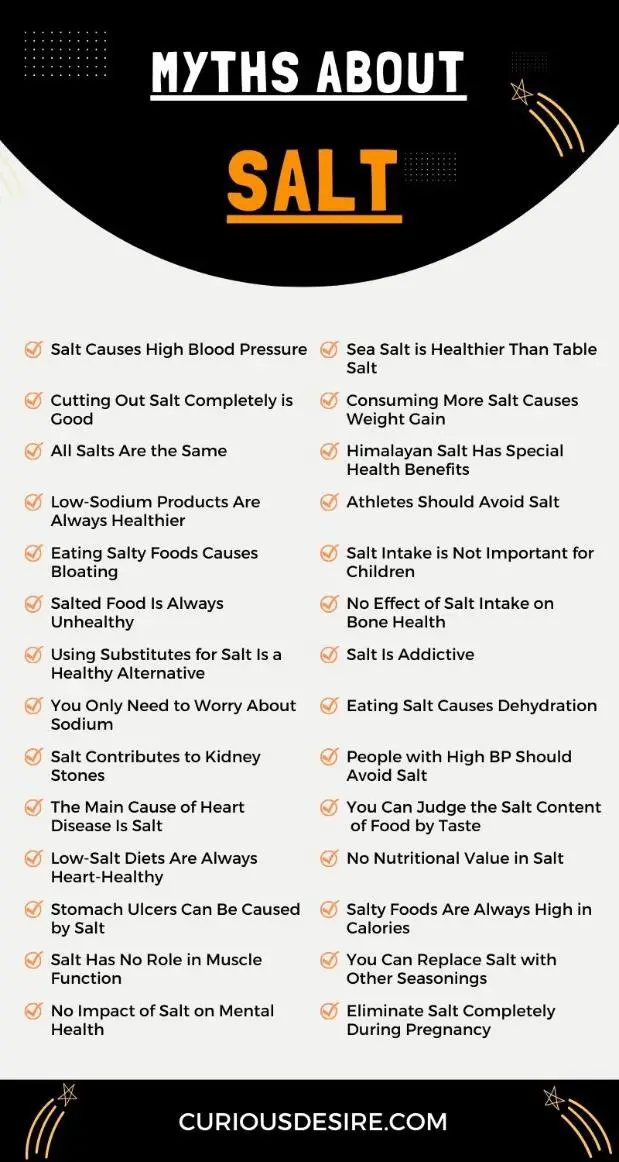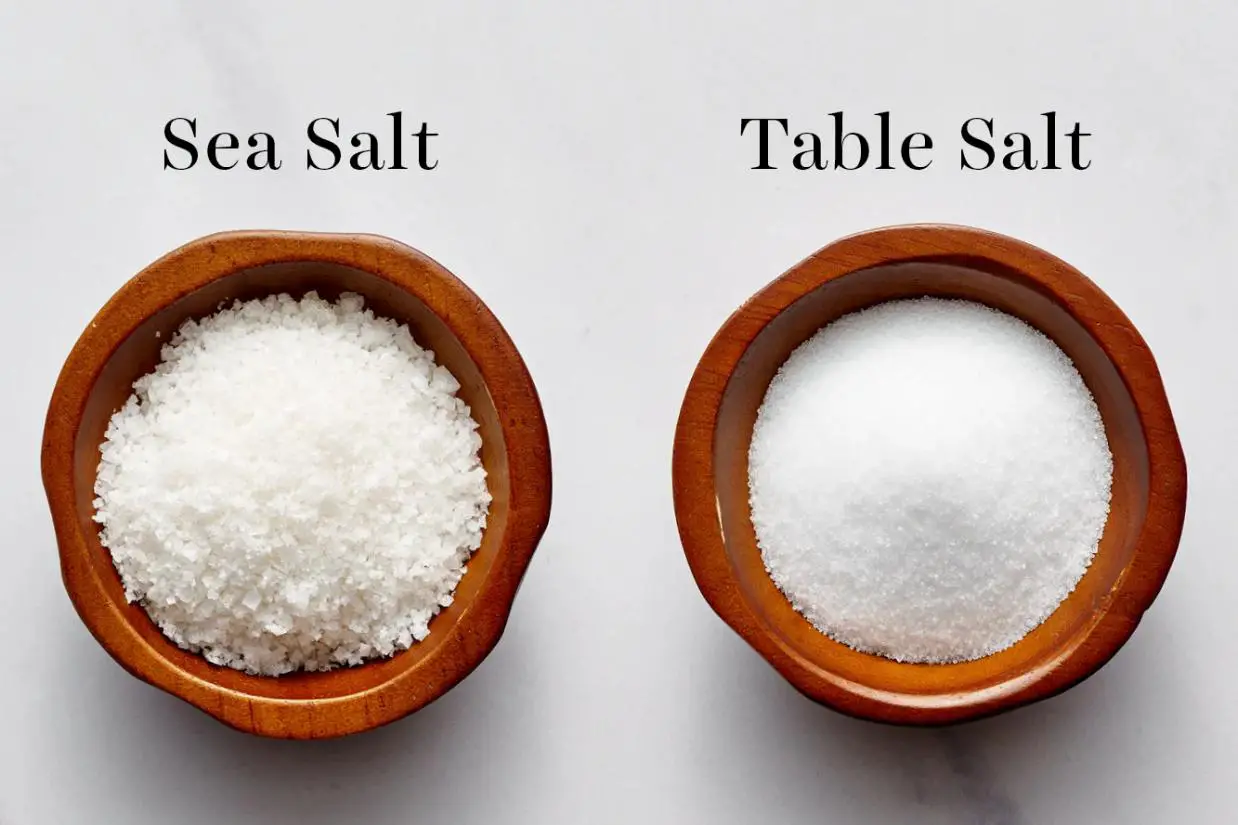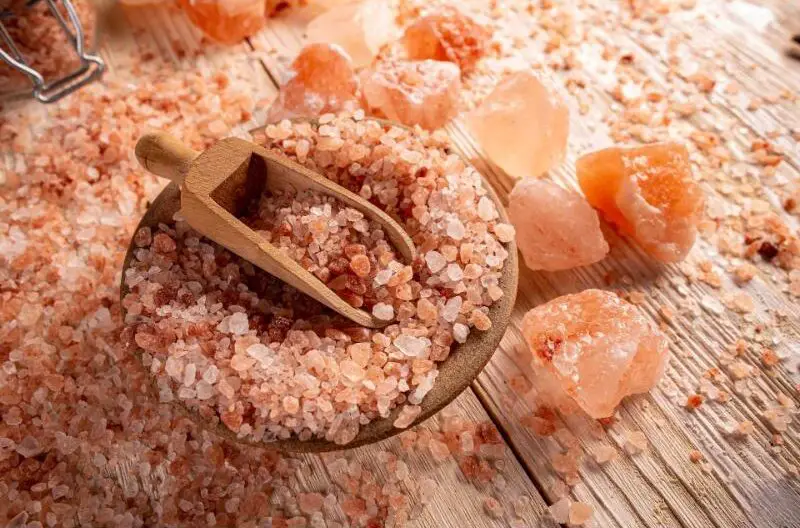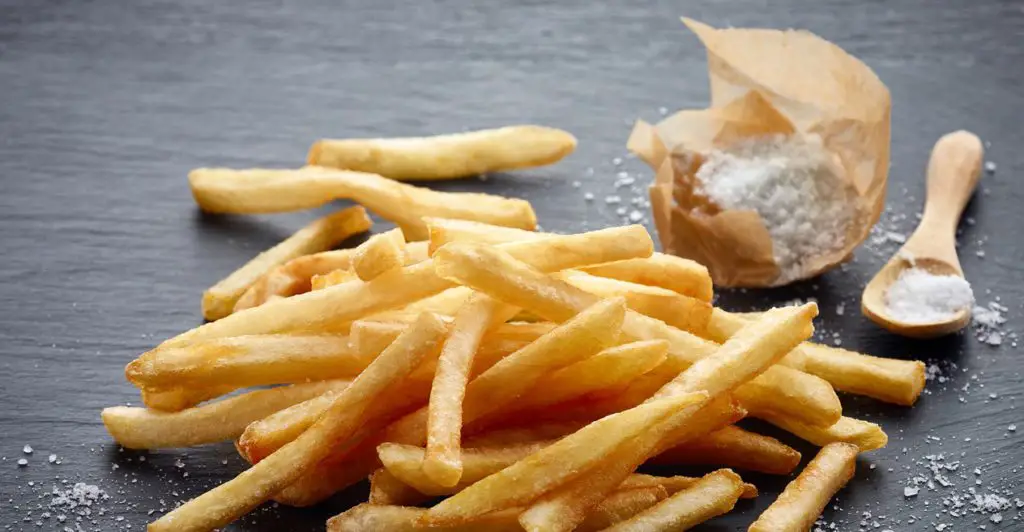We all use salt in our cooking, but let’s be honest – figuring out whether it’s good or bad for us can be a bit confusing.
In this article, we’re tackling some everyday myths about salt to help you understand it better.
Whether you’re a cooking pro or just trying to make your meals tastier, we’re here to clear things up.
5 Most Common Myths About Salts
- Salt causes high blood pressure.
- All Salts Are the Same
- Cutting out salt completely is good for your health.
- Salt makes you gain weight.
- Athletes should avoid salt.
[toc]

Myth 1: Salt Causes High Blood Pressure
Why this Myth Exists:
Some people believe that eating too much salt can make your blood pressure go up. This idea came from studies that saw a link between eating a lot of salt and having high blood pressure.
Many individuals have heard a lot about it in health campaigns, making them think that salt is a big reason for high blood pressure.
Debunking the Myth:
While having too much salt can cause high blood pressure it’s not that simple. Factors like your family history, how old you are, and how healthy you are also matter.
Some recent studies say that moderate salt eating doesn’t always mean you’ll get high blood pressure.
So, it’s important to understand that health is different for everyone, and just blaming salt might not be the whole story.
Myth 2: Sea Salt is Healthier Than Table Salt
Why this Myth Exists:
It is commonly a belief that sea salt is better because it seems more natural. We often believe that natural things are healthier.
Sea salt also has some minerals in it, and the ads on salts make it sound super healthy.
Debunking the Myth:
Contrary to this popular myth, sea salt and table salt are almost the same when it comes to nutrition. Sea salt does have a few minerals, but you won’t get much from the salt you put in your food.
Instead of getting caught up in the sea salt hype, it’s better to focus on eating a mix of healthy foods.

Myth 3: Cutting Out Salt Completely is Good for Your Health
Why this Myth Exists:
Many individuals often hear about the downsides of having too much salt, making them think that going for zero salt is the best choice.
Health guides sometimes say we should eat less salt, making some think none at all is even better.
Debunking the Myth:
Having some salt is essential for our bodies to function properly. If we completely cut out salt, things might not work the way they should.
The key is finding the right balance – not too much and not too little. It’s like finding the sweet spot for a healthy diet.
Balancing is the secret ingredient to keeping everything in check.
Myth 4: Consuming More Salt Causes Weight Gain
Why this Myth Exists:
When we eat lots of salty stuff, our bodies can hold onto more water. People notice this on the scale and think they gained fat.
Debunking the Myth:
Salt doesn’t lead to fat gain; the extra weight it might add is just water, and our bodies are pretty good at sorting that out.
Understanding the distinction between temporary water weight and actual fat gain is crucial.
So, if you notice a quick change on the scale after a salty meal, it’s likely just temporary water retention – nothing to worry about in the long run.
Myth 5: All Salts Are the Same
Why this Myth Exists:
Believe it or not, companies want us to believe their salt has something special, so they keep on advertising that it’s different and healthier.
Certain people hear this so much that they start thinking some salts are way better than others.
Debunking the Myth:
No matter what the ads say, all salts are pretty much the same inside – they’re mostly sodium chloride. Our bodies handle them in similar ways.
Don’t get fooled by the fancy names – salt is salt. Understanding this helps us make smarter choices without falling for marketing tricks.
And remember, there are many types of salt around the world. They might taste a bit different, but inside, they’re still doing the same job in our bodies!
Myth 11: Salted Food Is Always Unhealthy
Why this Myth Exists:
Because we often hear that too much salt is bad, some people believe anything with salt is automatically unhealthy.
It’s like thinking all salted food is a no-go without considering what else is in the meal.
Debunking the Myth
Not all salted food is bad! indeed, too much processed and super salty food isn’t a wise choice. But many tasty and healthy dishes have a bit of salt for flavor.
It’s important to look at the whole meal, not just the salt. Realizing that salt can be part of a balanced and nutritious diet helps clear up this misconception.
Myth 12: There Is No Effect of Salt Intake on Bone Health
Why this Myth Exists:
People usually talk a lot about calcium and vitamin D for strong bones, and salt doesn’t get as much attention.
This has led some to think salt doesn’t really impact how healthy our bones are.
Debunking the Myth
When we consume too much salt, our bodies respond by increasing the amount of calcium excreted in our urine. Calcium is a crucial mineral for bone health, as it contributes to the strength and density of our bones.
The increased loss of calcium through urine, caused by excessive salt intake, can lead to a negative calcium balance in the body over time.
A negative calcium balance means that more calcium is leaving the body than is being absorbed or obtained from the diet.
Prolonged negative calcium balance can potentially contribute to a reduction in bone mineral density, making bones more susceptible to conditions like osteoporosis.
While the impact of salt on bone health may not be as direct or immediate as some other nutrients, it becomes significant over the long term.
Therefore, ensuring the right balance of salt in our diet is an important aspect of promoting overall bone health, especially as it influences the body’s calcium balance.
Myth 13: Using Substitutes for Salt Is a Healthy Alternative
Why this Myth Exists:
Thinking about cutting down on salt, most people start to believe that using substitutes might seem like a smart move.
The idea is that these alternatives taste similar but without the supposed health risks.
Debunking the Myth:
Myth 14: Salt Is Addictive
Why this Myth Exists:
As we all know salt has this amazing ability to make food taste better, and it’s in so many of our favorite snacks and dishes.
Because of that, some people started thinking that salt is like those things that you can get addicted to.
Debunking the Myth:
The truth is, while salt can make us want to eat something, it’s not like being addicted to something serious.
When we crave salty food, it’s more about what we’re used to and what we like. It’s not a true addiction where our bodies really need it to function.
Understanding that our love for salty foods is more about habits and taste preferences helps debunk this myth.
So, while we might really enjoy a salty snack, it’s not the same as being addicted to something big.
Myth 15: You Only Need to Worry About Sodium in Table Salt
Why this Myth Exists:
When we hear “sodium,” our minds often jump to table salt (sodium chloride).
This association has led to the misconception that sodium concerns are only relevant when using table salt.
Debunking the Myth
Sodium is not just in the salt we add to our food; it’s also in many other foods, especially those that are processed, like chips or canned soups.
If we want to keep our hearts healthy, we need to pay attention to how much sodium is in the different foods we eat.
Myth 16: Eating Salt Causes Dehydration
Why this Myth Exists:
The myth that salt causes dehydration exists due to the association between salt and water retention. When people consume a lot of salt, their bodies might hold on to more water, leading to temporary weight gain and bloating.
This visible effect of increased water in the body has contributed to the belief that salt directly causes dehydration.
The logic goes like this: if salt makes the body hold onto water, then it must lead to a loss of water elsewhere, resulting in dehydration.
Debunking the Myth
While having too much salt can make us retain water for a bit, it doesn’t directly cause dehydration. In reality, salt is essential for keeping the right fluid balance in our bodies.
Dehydration is more likely due to not drinking enough water or other factors unrelated to salt.
Myth 17: Salt Contributes to Kidney Stones
Why this Myth Exists:
Worries about kidney health and how salt affects fluids have led to the belief that salt plays a big role in forming kidney stones.
Debunking the Myth:
The main factors causing kidney stones are not enough fluid intake and specific food choices. While too much salt might play a small part in calcium leaving our bodies through pee, it’s not the main cause of kidney stones.
Keeping hydrated and having a balanced diet is crucial for preventing kidney stones. Acknowledging that kidney stones come from different factors, not just salt, helps clear up this myth.
Myth 18: People with High Blood Pressure Should Avoid All Salty Foods
Why Does This Myth Exist?
The myth suggesting that folks with high blood pressure should stay away from all salty foods has its roots in the connection between sodium (found in salt) and hypertension.
Debunking the Myth:
Not everyone with high blood pressure needs to wave goodbye to all salty foods. It’s more about keeping an eye on how much sodium you’re taking in and considering your overall diet.
Likewise, it’s also important to consider that individuals vary in how they respond to salt – for some, even a little can affect their blood pressure, while others handle it just fine.
Myth 19: The Main Cause of Heart Disease Is Salt
Why Does This Myth Exist?
There is this common belief that eating too much salt isn’t a good idea in food as it can cause heart problems. The reason behind this idea is the connection between having a lot of sodium (which is a part of salt) and high blood pressure.
As sodium attracts water, and when there’s an increase in sodium in the bloodstream, the body tends to retain more water to balance it out. This extra water can lead to an increase in blood volume.
The additional water retained increases the overall volume of blood circulating in the arteries. As a result, the pressure on the walls of the arteries rises.
Debunking the Myth:
Sure, too much salt can mess with blood pressure, but heart disease is like a puzzle with lots of pieces. The genetic makeup of a person, what he eats, and how he lives play a big role too.
It’s not just about cutting salt – a balanced diet, staying active, and keeping your heart in good shape all matter. Recognizing that heart disease isn’t only about salt helps untangle this myth.
Myth 20: You Can Judge the Salt Content of Food by Taste
Why Does This Myth Exist?
The myth that you can judge the salt content of food by its taste originates from a common but overly simplified understanding of how our taste buds perceive saltiness.
Debunking the Myth:
Our taste buds can be a bit tricky when it comes to finding hidden salt in food. Some things might not taste very salty, but they can still have a lot of salt hiding inside, especially in processed foods.
So, if we only trust our taste buds, we might not realize just how much salt we’re actually eating. That’s why it’s important to become like food detectives and read the labels on the things we eat.
These labels give us clues about how much salt is in the food, helping us make smart choices and keeping our salt intake in check.
Myth 21: Low-Salt Diets Are Always Heart-Healthy
Why Does This Myth Exist?
Some believe that saying no to salt completely is the best way to keep our hearts healthy. But, guess what? Not everyone’s heart is the same!
Debunking the Myth
For some individuals, adopting an extremely low-salt diet may lead to complications like imbalances in electrolytes. A heart-healthy journey involves discovering the right balance that suits your individual requirements.
It’s essential to move away from the notion of a universal super low-salt rule. Instead, recognizing the importance of a balanced approach based on your specific needs is key to a healthy heart.
Myth 22: No Nutritional Value in Salt
Why the Myth Exists:
The myth that salt has no nutritional value stems from a misunderstanding about what “nutritional value” means and overlooking the essential role that salt plays in our bodies.
Nutritional value often brings to mind vitamins, minerals, and other substances that our bodies need to function. Since salt is primarily sodium chloride, it’s easy to overlook its significance.
Debunking the Myth:
Salt, or sodium chloride, provides essential sodium, a very important electrolyte that plays a role in various physiological functions, including nerve transmission and muscle contraction.
While excessive intake poses risks, moderate amounts of salt are necessary for maintaining proper bodily functions.
Myth 23: Stomach Ulcers Can Be Caused by Salt
Why the Myth Exists:
In the past, there was a significant misconception linking high-salt diets directly to the development of stomach ulcers.
This historical association has roots in early medical observations that suggested individuals with stomach ulcers often had diets high in salt.
Debunking the Myth:
The primary cause of stomach ulcers is the bacterium Helicobacter pylori and certain medications like nonsteroidal anti-inflammatory drugs (NSAIDs), not salt intake.
While a balanced salt intake is essential for overall health, blaming salt alone for stomach ulcers oversimplifies the condition.
Studies have found that salt plays a role in increasing pylori’s presence in the body, but this occurs only if you exceed the recommended salt intake amount.
Just fearing that mere consumption of salt will cause ulcers isn’t the case. Recognizing the complexity of factors contributing to stomach ulcers helps dispel this myth.
Myth 24: Salty Foods Are Always High in Calories
Why the Myth Exists:
The myth that salty foods are always high in calories arises from a common yet false assumption about the relationship between taste and caloric content.
Rich and flavorful tastes, like salty or savory, are often associated with high-calorie content.
Since many indulgent or “treat” foods are salty, the assumption follows that they must be packed with calories.
Debunking the Myth:
While some salty snacks and processed foods may be calorically dense, not all salty foods have this characteristic. Many nutritious dishes incorporate salt to enhance flavors without significantly impacting calorie content.
It’s essential to consider the overall composition of the meal rather than associating saltiness with high caloric value.
Myth 25: Salt Has No Role in Muscle Function
Why the Myth Exists:
The focus on other nutrients like protein and carbohydrates in relation to muscle function has led to the misconception that salt plays no significant role in this aspect of physiology.
Debunking the Myth:
As mentioned earlier, sodium, a key component of salt, is important for muscle contraction and nerve transmission. Similarly, proper electrolyte balance, which includes sodium, is essential for overall muscle function.
While macronutrients like protein and carbohydrates certainly play significant roles, it’s important to recognize that micronutrients, including electrolytes like sodium, also contribute to the proper functioning of our muscles and nerves.
Therefore, understanding the diverse roles of both macronutrients and micronutrients is essential for a comprehensive perspective on nutrition and its impact on our body’s functions.
Myth 26: You Can Replace Salt with Other Seasonings Without Consequence
Why the Myth Exists:
There is this myth that you can replace salt with other seasonings without consequence stems from a hopeful but naive view of flavor substitutes.
People are often encouraged to explore various herbs and spices as alternatives to salt for flavoring their meals. This led to this misunderstanding that making this swap would have no consequences.
Debunking the Myth:
While using different seasonings can make food more tasty, salt has a special way of making flavors pop that’s hard to replicate.
If you completely take out salt, your meals might end up tasting a bit plain and not so yummy. And when that happens, some individuals might try to make up for it by adding not-so-healthy spices to make the flavors better.
The secret to tasty and healthy meals is to use just the right amount of salt and other seasonings.
Knowing that salt has its own special role in making food delicious helps us understand that it can’t be replaced entirely.
Myth 27: There Are No Impact of Salt on Mental Health
Why the Myth Exists:
There is this perception that salt has no impact on mental health because they associate mental well-being more with emotions than with dietary habits.
Debunking the Myth:
Sodium plays a role in nerve function, including those in the brain.
While excessive salt intake is not a direct cause of mental health issues, maintaining a balanced diet that includes essential nutrients, including sodium, contributes to overall well-being, including mental health.
Myth 28: Eliminate Salt Completely During Pregnancy
Why the Myth Exists:
Concerns about potential complications during pregnancy have led to the belief that pregnant individuals should eliminate salt entirely to mitigate perceived risks.
Debunking the Myth:
For pregnant women, it’s important to keep the right balance of things like sodium (which comes from salt) in your body. Getting rid of salt completely can cause imbalances and maybe even health problems.
Instead of saying goodbye to salt, it’s better to keep an eye on how much you’re having.
Just like with other food you eat, moderation is the key during pregnancy to make sure you’re having a healthy and balanced diet.
Salt Myths FAQs
Why salt is not the enemy?
Salt is not the enemy when consumed in moderation. It is an essential component that plays a crucial role in various bodily functions, including maintaining proper fluid balance, supporting nerve function, and aiding in muscle contractions.
The key is to strike a balance and avoid excessive salt intake, as moderation is key to a healthy lifestyle.
How bad is salt for high blood pressure?
While excessive salt intake can contribute to high blood pressure in some individuals, it’s not the sole factor. Factors such as genetics, age, and overall health play significant roles.
Moderation in salt consumption, coupled with a balanced diet and a healthy lifestyle, can help manage blood pressure effectively.
Is it OK to cook with salt?
Yes, it is perfectly okay to cook with salt. In fact, salt is a crucial ingredient in enhancing the flavor of dishes. The key is to use it in moderation.
Cooking with salt can contribute to a well-rounded and flavorful meal without necessarily leading to excessive sodium intake.
How not to eat salt?
To reduce salt intake, avoid heavily processed foods, as they often contain high levels of hidden salt. Opt for fresh, whole foods, and cook at home to have better control over the amount of salt in your meals.
Reading food labels can also help you make informed choices and choose low-sodium alternatives.
Why is salt bad for you?
Excessive salt intake is associated with health issues such as high blood pressure, which can increase the risk of heart disease and stroke.
Additionally, overconsumption of salt may lead to fluid retention, kidney problems, and other health complications. Moderation is crucial to prevent these adverse effects.
What are the 3 negative signs of eating too much salt?
- High Blood Pressure: Excessive salt intake is linked to elevated blood pressure.
- Edema (Swelling): Consuming too much salt may cause fluid retention, leading to swelling in the extremities.
- Kidney Issues: Over time, excessive salt can strain the kidneys and contribute to kidney problems.
Is salt good or bad for you?
Salt is not inherently bad for you; it’s about the quantity and quality. In moderate amounts, salt is essential for bodily functions. The key is to strike a balance and avoid excessive intake, which can contribute to health issues.
Which organ is affected by too much salt?
The kidneys are particularly affected by excessive salt intake. High salt levels can strain the kidneys, potentially leading to kidney problems over time.
Does salt make you gain weight?
Salt itself does not cause weight gain. However, excessive salt intake may lead to temporary water retention, which can result in a slight increase in weight.
This is not the same as gaining fat, and the effect is usually temporary.
What happens if I stop eating salt?
While reducing salt intake is beneficial, completely eliminating salt is not advisable. Salt is essential for maintaining electrolyte balance, and a sudden halt in salt consumption can lead to deficiencies, negatively affecting nerve function and muscle contractions.
How can I reduce salt in my body fast?
To reduce salt intake quickly, focus on drinking plenty of water to help flush excess sodium from the body. Additionally, choose fresh, whole foods, and avoid processed items.
Regular exercise can also aid in sodium excretion through sweat.
What foods are high in salt?
Foods high in salt include processed and packaged items such as canned soups, processed meats, snack foods, and certain condiments.
Restaurant and fast food meals can also be high in salt.
What is the healthiest salt to eat?
While no salt is entirely “healthy” in excess, options like sea salt, Himalayan salt, and kosher salt may contain trace minerals.
However, the nutritional differences between these and regular table salt are minimal.
Are eggs high in salt?
Eggs in their natural state are not high in salt. However, the salt content can increase if you add salt during cooking or consume processed egg products.
Are bananas high in salt?
Bananas are naturally low in salt. They are a good choice for a low-sodium snack and provide essential nutrients like potassium, which can help balance sodium levels in the body.

